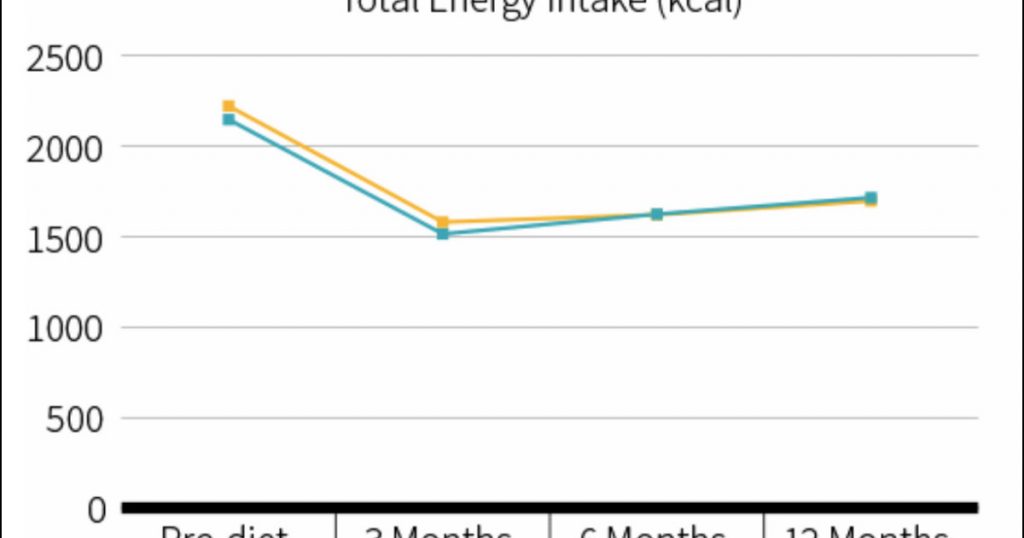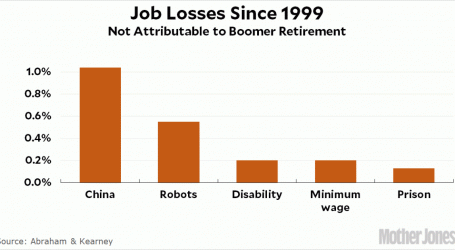What’s the Real Takeaway From Yesterday’s Big Low-Carb vs. Low-Fat Showdown?
Looking for news you can trust?Subscribe to our free newsletters.
A number of people have pointed out to me that the New York Times has a very different take on yesterday’s big diet study:
The Key to Weight Loss Is Diet Quality, Not Quantity, a New Study Finds
A new study, published Tuesday in JAMA…found that people who cut back on added sugar, refined grains and highly processed foods while concentrating on eating plenty of vegetables and whole foods — without worrying about counting calories or limiting portion sizes — lost significant amounts of weight over the course of a year….The research lends strong support to the notion that diet quality, not quantity, is what helps people lose and manage their weight most easily in the long run. It also suggests that health authorities should shift away from telling the public to obsess over calories and instead encourage Americans to avoid processed foods that are made with refined starches and added sugar.
This was not my emphasis. I led with the comparison of low-fat and low-carb diets. Why the difference?
First things first. I didn’t have access to the study itself, which is often reason enough for me not to comment on something. On the other hand, here’s the abstract:
Conclusions and Relevance In this 12-month weight loss diet study, there was no significant difference in weight change between a healthy low-fat diet vs a healthy low-carbohydrate diet, and neither genotype pattern nor baseline insulin secretion was associated with the dietary effects on weight loss. In the context of these 2 common weight loss diet approaches, neither of the 2 hypothesized predisposing factors was helpful in identifying which diet was better for whom.
It sure seems like the main point of the study was to compare low-fat vs. low-carb diets, and to test the insulin secretion theory underlying low-carb diets. In any case, the reason I went ahead and commented even without reading the paper was because Examine.com had a long, detailed, and seemingly fair-minded description of the study. Here’s one of their charts:
It’s true that the researchers didn’t emphasize calorie counting. They recommended generally healthy eating combined with an emphasis on either low-carb or low-fat diets. The result, however, was that participants ended up consuming about 500 fewer calories per day. That’s a huge amount, and is almost certainly the reason for the weight loss. In fact, I’m surprised the average weight loss wasn’t more. But what underlies this large reduction in calorie consumption? Here’s what the lead author, Christopher Gardner, told Examine.com:
We did not “prescribe” a specific caloric restriction. We focused on reducing foods high in fats or foods high in carbs, and we advised the participants that they needed to find the lowest level of fat or carb intake they could achieve while not feeling hungry….We wanted for them to find a new eating pattern they could maintain without even thinking of it as a “diet”….Table 2 in the paper shows that the participants reported “achieving” a ≈500 calorie deficit, without us prescribing one … and it was fairly consistent through the 12 months. Now, I honestly think they likely exaggerated the caloric restriction. But in fact they did lose >6,500 lbs collectively…So they must have eaten less. I think this is an important area to explore.
That highlighted section has been the advice of nutritionists forever. If you think of something as a “diet,” you’ll eventually fall off the wagon. But if you think of it as making a permanent, sustainable lifestyle change, you’ll…
…well, as near as I can tell, you’ll probably still fall off the wagon eventually. But it will take longer. In any case, there’s exactly zero that’s new here. And the general advice to eat more vegetables and cut back on processed foods, added sugar, and refined grains is likewise of longstanding. My take is that there’s just nothing new in this part of the study. What’s new is comparing low-fat to low-carb diets in a fairly rigorous way, and then checking the insulin secretion theory of the low-carb diet. So that’s what I emphasized.
POSTSCRIPT: There’s still the question of why a low-carb or low-fat diet leads to lower calorie consumption. One theory is that as you get used to it, your hunger decreases and you just naturally eat less. Another theory is that these diets are pretty boring and make eating less attractive. Yet another theory is that carbs and fats are the main sources of calories in American diets, so if you significantly cut back on one or the other you’re almost certain to cut back on calories too. It takes a helluva lot of vegetables to make up for not eating meat or bread, and few people are that crazy for vegetables.
In any case, if you cut back on something with lots of calories, you’re cutting back on calories. As I said yesterday, “As near as I can tell, the bottom line is that if you want to lose weight, eat less.” The big difference between me and the New York Times is that they made this the lead, while I made it my last paragraph.




